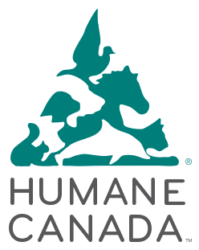Our feline friends are facing issues such as homelessness, starvation, forced breeding, neglect and abuse. They need our help, and Humane Canada is raising funds and awareness for cats across Canada. We are SO close to reaching our goal and that’s why we’ve extended our deadline by one week, to July 17th.
Join us in our pledge to support cats through our 10 CATmitments, now and all year long. Scroll down to learn about our CATmitments!
You have the power to help felines across Canada. Will you take action?
Our 10 CATmitments are:
1. Reduce overpopulation through spay/neuter programs: Unspayed female cats can have multiple litters of kittens each year, increasing the homeless pet population, and putting a big strain on shelters that are already struggling. Spaying & neutering cats will reduce overpopulation thus easing the burden on shelters, reduce the spread of disease and decrease feline homelessness and suffering.
2. Reunite lost pets through microchipping and ID: Permanent identification such as microchips can increase the return-to-owner ratio of lost pets by over 50%. In 1995 Humane Canada began harmonizing pet microchipping systems across Canada, helping to keep pets together with their families.
3. Support the welfare of cats in shelters & in the community: Shelter environments can be stressful for animals, especially cats, so it is important that SPCA’s & Humane Societies use best practices to create a humane environment. In 2013 we created the Canadian Standards of Care for Shelter Animals to provide guidance on recommended practices of care to ensure that shelter animal needs are met.
4. Recommend the safety of home: It is proven that indoor cats live longer, happier, healthier lives than their outdoor friends. Cats kept indoors will have less risk of injury, disease and getting lost. If you give your cat access to the outdoors, it is best to do it in a supervised, enclosed space such as a CATio.
5. Nurture good health and welfare: Routine veterinary exams, vaccinations, deworming and proper nutrition play an important role in the health of cats. Giving cats a loving, enriched home and educating our next generation on the humane treatment of cats, will help keep our feline friends happy and healthy.
6. Promote quality nutrition and end hunger: By talking to your veterinarian, doing your research and feeding our cats high-quality ingredients, they will live longer, healthier lives. Humane Canada’s National Pet Food Bank program supports SPCA’s, Humane Societies, and rescues through grants, so they can offer pet food bank services to families & pets in need, in their own communities.
7. End homelessness and elevate adoption: In addition to spaying & neutering cats, adoption plays an important role in ending cat homelessness. There are countless felines across our country in foster and shelters awaiting a furever home. Adopting rather than purchasing a cat will not only save the life of a shelter cat, but it will reduce the number of backyard breeders unnecessarily breeding cats in our communities.
8. Reduce wildlife conflicts: Keeping cats indoors or providing a safe, enclosed outdoor space will reduce the risk of interaction between cats and wildlife, keeping both cats, birds, and other wildlife safe.
9. Enhance natural behaviors: Enriching natural behaviors in shelters and at home such as social play and toys, allowed areas for scratching, clean litter for elimination, their own resting area or bed, etc. will contribute to a cat’s overall well-being.
10. END FELINE SUFFERING: By raising awareness about the suffering of cats, humane education, proper care and following our CATmitments, we can help reduce homelessness, overpopulation, and suffering of our feline friends and allow Canadians to see the value they bring to our lives.
If you’re having trouble making your donation, please call 1-888-678-2347 ext.11 or email melissa@humanecanada.ca.

